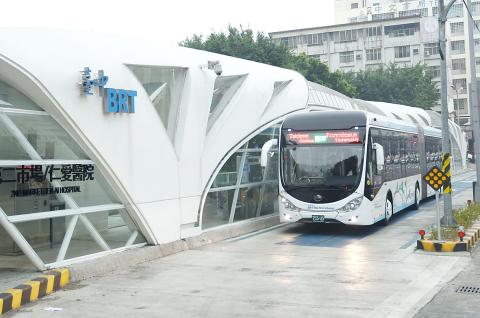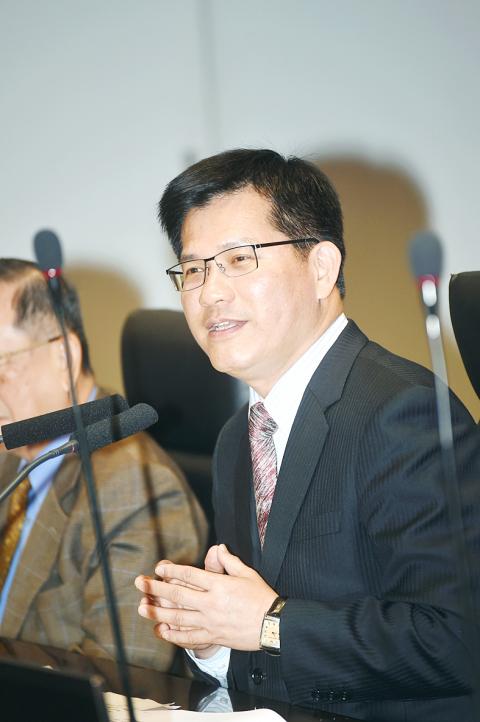The problem-plagued Bus Rapid Transit (BRT) system in Taichung, launched in July last year, is to be abolished after Taichung Mayor Lin Chia-lung (林佳龍) yesterday announced that the BRT lanes would be replaced with “optimized, dedicated bus lanes” starting on July 8.
Lin made the announcement at a city administration meeting.
He declined to describe the move as the “abortion” of the system, instead calling the city’s existing system “stillborn,” as BRT buses do not possess exclusive road rights or priority traffic signals, and the BRT traffic control center cannot communicate directly with the buses while they are on the road or at its stations.

Photo: Liao Yao-tung, Taipei Times
Under the new policy, existing BRT lanes would be exclusively for public buses that currently run on the dedicated bus-only lanes on Taiwan Boulevard (台灣大道) — the main road through the heart of the city — while BRT double-carriage buses would continue to run on the lanes after concerns over safety are addressed, the Taichung Transportation Bureau said.
About 30 percent of the public buses on Taiwan Boulevard would then be allowed to travel on the dedicated bus-only lanes, leaving slower lanes for motorists and motorcyclists, while at lease two bus lines on Taiwan Boulevard would continue to operate on the slow lanes for passengers using minor stations, the bureau said.
All the buses running on the “optimized dedicated bus lanes” would have a uniform look so that they can be easily identified, Lin said.

Photo: Liao Yao-tung, Taipei Times
“Their new livery will become Taichung’s new mobile landmark,” he added.
Lin said that decision would save the city government NT$28 billion (US$893.1 million) previously allocated for the completion of existing BRT lanes — and an additional five BRT lanes — adding that the money would be used to improve the city’s traffic management.
The city government contracted a team of experts to examine and review the BRT system after Lin took office in December last year.
The report was concluded on Saturday.
Lin said that the “optimized dedicated bus lanes” program integrates two proposals — “BRT Plus Bus” and “Pure Bus” — among the four suggested by the team.
The other two suggestions — “Pure BRT” and “BRT Plus Bus plus priority traffic signals” — were not accepted, after an evaluation found the difficulties in implementation were insuperable, Lin said.
The BRT system was the subject of heated debate among Taichung candidates in the nine-in-one elections in November last year.
When the system was launched by then-mayor Jason Hu (胡志強) of the Chinese Nationalist Party (KMT), Lin, a member of the Democratic Progressive Party, criticized Hu for rushing it through in a bid to garner votes in his re-election effort.
Lin said yesterday that the system was a failure in its establishment and operation.
Some motorists have complained about traffic congestion and what they describe as difficulty changing lanes, since BRT stations and lines were built on the islands between slow and express lanes.
A motorist surnamed Liu (劉) expressed disapproval of the new program, saying it would not make it any easier to change lanes and could increase the likelihood of an accident with more public buses running on the lanes.
Having the BRT lanes accommodate so many buses would only slow traffic, an unidentified KMT Taichung city councilor reportedly said, adding that Lin opposed the BRT just because it was a project of Hu’s.
The Ministry of Transportation and Communications later yesterday said that it would not ask the Taichung City Government to return the NT$163 million appropriated by the city to subsidize the construction of the BRT system.
The budget was given to the city to build the bus system and for the operator to purchase buses, ministry official Hu Ti-chi (胡迪琦) said, adding that, as the city plans to continue using the facilities despite the decision it made regarding the BRT lanes yesterday, the ministry would not ask the city to return the money.

A preclearance service to facilitate entry for people traveling to select airports in Japan would be available from Thursday next week to Feb. 25 at Taiwan Taoyuan International Airport, Taoyuan International Airport Corp (TIAC) said on Tuesday. The service was first made available to Taiwanese travelers throughout the winter vacation of 2024 and during the Lunar New Year holiday. In addition to flights to the Japanese cities of Hakodate, Asahikawa, Akita, Sendai, Niigata, Okayama, Takamatsu, Kumamoto and Kagoshima, the service would be available to travelers to Kobe and Oita. The service can be accessed by passengers of 15 flight routes operated by

GIVE AND TAKE: Blood demand continues to rise each year, while fewer young donors are available due to the nation’s falling birthrate, a doctor said Blood donors can redeem points earned from donations to obtain limited edition Formosan black bear travel mugs, the Kaohsiung Blood Center said yesterday, as it announced a goal of stocking 20,000 units of blood prior to the Lunar New Year. The last month of the lunar year is National Blood Donation Month, when local centers seek to stockpile blood for use during the Lunar New Year holiday. The blood demand in southern Taiwan — including Tainan and Kaohsiung, as well as Chiayi, Pingtung, Penghu and Taitung counties — is about 2,000 units per day, the center said. The donation campaign aims to boost

ENHANCING EFFICIENCY: The apron can accommodate 16 airplanes overnight at Taoyuan airport while work on the third runway continues, the transport minister said A new temporary overnight parking apron at Taiwan Taoyuan International Airport is to start operating on Friday next week to boost operational efficiency while the third runway is being constructed, the Ministry of Transportation and Communications said yesterday. The apron — one of the crucial projects in the construction of the third runway — can accommodate 16 aircraft overnight at the nation’s largest international airport, Minister of Transportation and Communications Chen Shih-kai (陳世凱) told reporters while inspecting the new facility yesterday morning. Aside from providing the airport operator with greater flexibility in aircraft parking during the third runway construction,

American climber Alex Honnold is to attempt a free climb of Taipei 101 today at 9am, with traffic closures around the skyscraper. To accommodate the climb attempt and filming, the Taipei Department of Transportation said traffic controls would be enforced around the Taipei 101 area. If weather conditions delay the climb, the restrictions would be pushed back to tomorrow. Traffic controls would be in place today from 7am to 11am around the Taipei 101 area, the department said. Songzhi Road would be fully closed in both directions between Songlian Road and Xinyi Road Sec 5, it said, adding that bidirectional traffic controls would